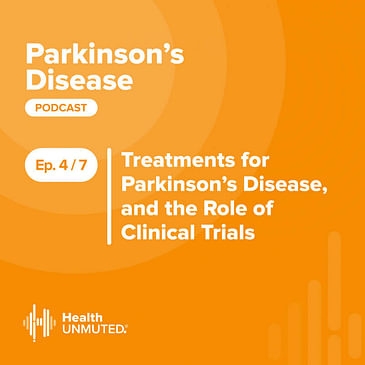There's no cure for Parkinson's disease, but there are ways to manage it and treat symptoms.
In this episode, we explore how different types of medications can help, and the importance of clinical trials in progressing treatment options.
We hear from people who are living with Parkinson’s disease about their medication journeys.
We also discuss an alternative surgical treatment that is available: deep brain stimulation.
What did you think of this episode? We’d love to hear from you.
Please visit healthunmuted.com/feedback to let us know!
Resources
Medication
- Medication explained - Mayo Clinic
- Webinar about on/off time - Michael J Fox foundation
- Parkinson’s Drugs- Parkinson’s UK Resource
- FDA Approved Medications- APDA
Terms Mentioned
- Carbidopa-levodopa - Mayo Clinic
- Sinemet, Parcopa, Duopa and other brand names for Sinemet - on Medscape
- Dopamine agonists (pramipexole, ropinirole) - Mayo Clinic
- Dyskinesia- Parkinson Foundation
- Deep Brain Stimulation - Mayo Clinic
Alternative Surgical Treatment Option
- Deep Brain Stimulation - Parkinson's Org
Clinical Trials
- Clinical Trials- Parkinson’s Foundation
- Clinical Trials Recruiting- Cure Parkinsons
Podcasts
Community Group
A transcript of this episode is available below.
Transcript
[00:00:00] Anna: A diagnosis of Parkinson’s disease is often shortly followed by a lot of choices, including whether to start medication.
[00:00:09] Kat Hill: I was really not wanting to start on medicine right away. I was worried about the long term side effects.
[00:00:16] Anna: It may take some trial and error to find out what medication works for you.
[00:00:20] Jeff Lasley: I couldn’t tolerate as high a dose as my neurologist wanted to put me on because it made me sleepy. I would literally have to go take a nap in my car sometimes, cause I couldn’t stay awake at work.
[00:00:32] Anna: But there’s a reason to stay positive about the choices on offer.
[00:00:36] Dr. Pontone: It’s a very hopeful message because we have great symptomatic treatments for the disease, regardless of whether it’s early or traditional onset.
[00:00:44] Anna: In this episode, we’ll discuss some medication options that you may have heard about. How each of those medications work and the importance of knowing their impact on your symptoms. We’ll also hear about a more invasive surgical procedure. You’re gonna hear a lot of complex terms and names of drugs, but don’t worry. We’ll put links to information about all of them in the notes for this podcast on hupstaging.wpengine.com.
[00:01:08] Tim Hague: Right now it’s a day to day experiment. I’m sitting here shaking this entire interview. This is totally new in the last several months.
[00:01:16] Anna: Welcome to the Parkinson’s disease podcast. I’m your host, Anna Stoecklein. The Parkinson’s disease podcast was created for educational purposes only. It is not a substitute for formal medical advice. Please talk to your qualified healthcare provider for personal medical diagnosis and treatment.
[00:01:34] Dr. Lisk: The way we treat the movement symptoms of Parkinson’s is by giving you dopamine replacement.
[00:01:39] Anna: Remember, dopamine is that neurotransmitter we talked about in episode one. The most common drug prescribed is called carbidopa levodopa, commonly referred to as Sinemet. Although the brand name Sinemet was discontinued in 2019, you’ll often hear people use the term Sinemet when they discuss their medications.
Carbidopa levodopa is also available under other brand names, such as Parcopa and Duopa, among others. And don’t worry if you didn’t catch those names, we have links to all of them in the episode notes and on the website.
Now let’s hear more about these medications from Dr. Lisk, the movement disorder specialist we’ve met in previous episodes.
[00:02:23] Dr. Lisk: Carbidopa is an enzyme inhibitor, which means it reduces the breakdown of levodopa, which does the action. You take in levodopa, it gets converted to dopamine by an enzyme in your body. I’m giving you something that’s gonna convert into something natural in your body. That’s already there. You already have dopamine in your body. I’m just giving you more dopamine.
[00:02:43] Anna: The problem in Parkinson’s is a lack of dopamine in the brain, which causes symptoms like tremor, slowness, and stiffness.
So this medication improves those motor symptoms.
[00:02:54] Dr. Pontone: Medications are often introduced fairly early on. The response to those medications can have both therapeutic, but also prognostic implications.
[00:03:05] Anna: That means improving the overall progression of the condition. This is Dr. Gregory Pontone.
[00:03:11] Dr. Pontone: I’m a MD physician here at Johns Hopkins.
I’ve been here for about 20 years. I did my internship, residency and fellowship in both movement disorders, research and geriatric psychiatry. The traditional gold standard right now is levodopa containing compounds. And there’s different types of those. There’s the immediate release. And then there’s an extended release.
[00:03:37] Anna: In previous decades, levodopa was prescribed alone.
[00:03:41] Dr. Pontone: Levodopa is the precursor of dopamine, okay. The problem is that when levodopa is ingested, it needs to be absorbed and then cross the blood brain barrier.
[00:03:53] Anna: The blood brain barrier is a network of blood vessels and tissue that help keep harmful substances like bacteria and fungi from reaching the brain.
[00:04:02] Dr. Pontone: And what happens in between there is that it turns it into dopamine before it crosses the blood brain barrier. And that can cause nausea and vomiting.
[00:04:11] Anna: But now it is often combined with carbidopa to create carbidopa levodopa. Here’s why.
[00:04:18] Dr. Pontone: To minimize that they add this carpa molecule, which prevents that early conversion to dopamine so that it is mostly converted once it crosses a blood brain barrier. Most often people will be started three times a day. As the disease goes forward, their dosing might need to be modified both in terms of the amount, the dose size, but also the frequency of dose.
[00:04:40] Anna: There are also drugs called dopamine agonists. These drugs work in a different way to levodopa.
Dopamine agonists mimic the effect of dopamine without having to be converted.
[00:04:51] Dr. Pontone: The two most common are pramipexole and ropinirole.
[00:04:55] Anna: These drugs are often given to younger Parkinson’s patients at the beginning of their treatment, but they can have side effects.
[00:05:02] Dr. Pontone: Dopamine agonists probably cause these impulse control disorders and at least 15% of individuals with Parkinson’s disease, they increase the risk.
Now we have seen it with levodopa, but it seems to be more common with the dopamine agonists.
[00:05:17] Kat Hill: As my symptoms progressed, I took more and more of that medicine, or I needed more and more of that medicine to have the same effect. And I started to have some side effects from that. I was not sleeping well. I was having some compulsive behavior around the computer and some compulsive eating behaviors that weren’t healthy.
And a lot of young people that I talk with Parkinson’s disease have had some similar challenges with the agonist medication. So we talked to my movement disorder specialist right away about that. And I switched off of that and I still miss some of the great impact, it really helped with a lot of my stiff muscle issues, but it was not worth the trade offs.
[00:05:59] Anna: Before starting any medication, some newly diagnosed people volunteer to join clinical trials or studies of Parkinson’s disease. Here’s Jeff Lasley who we’ve heard from throughout the series.
[00:06:11] Jeff Lasley: There are a lot of opportunities to participate in research studies, both in terms of medications that are being developed, but you don’t always have to go that route.
[00:06:22] Anna: Clinical trials are vital in progressing the treatment of conditions, such as Parkinson’s disease. They can be used to test new medications or lifestyle changes. And in some cases work towards finding a cure.
[00:06:35] Jeff Lasley: There are lots of physical studies. I did a study where I had to wear sensors on different parts of my body and it tracked my movements and it was recorded onto a device that I then sent back in.
Those are really valuable and I find fulfilling as well.
[00:06:53] Anna: Dr. Mather wants more people with Parkinson’s to volunteer for trials.
[00:06:57] Dr. Mathur: There will be no better treatments or a cure without us and our involvement, but 80% of clinical trials are delayed because of recruitment difficulties. That’s a whole host and waste of time and resources and time and resources are something we don’t have as a community to waste.
So recruitment is a big issue and recruitment is often not because patients don’t wanna participate, but either because they don’t know about the trial or they’re not educated about the trial, they have some myths and misconceptions about clinical trials in general.
[00:07:26] Anna: And it’s particularly important if you’re a person of color or a woman with Parkinson’s.
[00:07:31] Dr. Lisk: A lot of the clinical trials may have a large majority of one ethnicity or one sex. So you may have more Caucasian men, but there’s a difference in Parkinson’s disease between women and men. And so having more women in clinical trials really represents women and lets us be able to do later a sub-analysis to break down, is this drug affecting women more or benefiting women more than men?
[00:08:00] Anna: If you’d like to find out more about opportunities to participate in Parkinson’s disease, clinical trials, more information will be in our resource list on hupstaging.wpengine.com. Once a person has a prescription of a Parkinson’s drug like carbidopa levodopa, timing of taking the pills is important.
[00:08:18] Dr. Mathur: I have many friends that have used their alarms in their phones, particularly to remind them to take their medications. I do put my pills in a pill organizer because I have so many to take. So I’m not running around looking for the bottle.
[00:08:32] Anna: Thank you for listening to the Parkinson’s disease podcast, part of the Health Unmuted library, please like subscribe or follow this series on your podcast player to stay aware of all future episode releases. So far, we’ve heard a lot about different medications to treat Parkinson’s and as is always the case with this disease, the experience is unique for each individual.
That’s why every person will need their own medication plan that’s developed in consultation with the medical team. It’s also why it’s important to keep monitoring your symptoms while taking medication and report changes back to your, or your loved one’s neurologist. This helps them adjust any prescriptions to best suit individual needs.
As Dr. Lisk explains:
[00:09:16] Dr. Lisk: it’s important to be organized when you go to your doctor. And so you’d need to write down the questions you have. Write down the name the milligram dosage of the tablet and how many times you take it per day. Symptom tracking is extremely important.
[00:09:31] Anna: Symptom tracking means paying attention to how you feel and what your body is doing at different times of the day after taking different medications.
[00:09:39] Tim Hague: I remember when I first started on my medication, I take one tab three times a day and it was like, I didn’t have Parkinson’s. I just took it all away. And now I’m lucky if I have an hour or two where I’m not having the significant symptom.
[00:09:53] Anna: A common side effect of Parkinson’s medication is often referred to as the on off phenomenon .
[00:09:59] Dr. Mathur: People with Parkinson’s will go through on and off periods on periods when their medications are working and off periods, when they wear off.
[00:10:05] Dr. Lisk: On time is the time where the medication kicks in and the medication’s working at its best. Let’s say my on time works for four hours. And then all of a sudden I start to feel my tremor come back a little bit. It’s not totally worn off. It’s wearing off. And then let’s say in about 30 minutes, it’s totally worn off. So that’s how you wanna talk to your doctor. You learn the language, you learn the lingo and you say my medication starts to wear off in about four hours and by four and a half hours, I’m totally off. You add up these little off periods throughout the day. And you tell your doctor, I have about two and a half hours of off time throughout the day. And so remember the on time is the good time. The off time is the time where the medication is not working.
[00:10:53] Anna: The periods of off time can increase as the disease progresses and doctors may increase medication doses to help a person get more on time.
[00:11:02] Jeff Lasley: Gradually I had to increase my medication to more frequently and higher doses. I couldn’t tolerate as high a dose as my neurologist wanted to put me on because it made me sleepy. I mean, I was still working at the time and I would literally have to go take a nap in my car sometimes, cause I couldn’t stay awake at work.
[00:11:23] Anna: It can often be a period of trial and error between a patient and their doctor to find a new regime that improves the on off period.
[00:11:30] Jeff Lasley: So we started adding in a little bit of Sinemet, which is carbidopa levodopa, and that works, but there are also consequences to that. If you take too much, you get what’s called dyskinesia, which are uncontrolled movements.
And I was experiencing that. So my on and off were becoming more pronounced. My medication would wear off and I’d suddenly moving slowly and having trouble speaking and increased tremor, shuffling gait problems like that. So then you’d take some carbidopa levodopa to try and get yourself feeling better.
And then you take a little more, cause it’s not working quickly enough. And then you end up in dyskinesia.
[00:12:13] Anna: Dyskinesia means uncontrollable and involuntary movements. It’s a side effect of long term levodopa use.
[00:12:20] Jeff Lasley: It’s a funny thing because it feels kind of good because you can move, but it can be dangerous because you can lose your balance and everything is exaggerated.
[00:12:30] Anna: However, it’s possible to improve the off time with added lifestyle changes.
[00:12:35] Dr. Mathur: It’s a very fine line to be able to balance those. Uh, what helps me to say more on is that regimented medication scheduled, trying not to miss a dose or delay a dose, trying to keep up on my self care, cause lack of sleep stress , poor nutrition can all add to my developing more off symptoms.
[00:12:54] Anna: Asking a family member or a caregiver to notice symptoms or changes might be useful too.
[00:12:59] Kat Hill: So I know for my husband and I, he is my primary care partner because we take care of each other. It’s not just one way. We sit down before my doctor’s appointments sometime a day or two before the appointment, just to check in with each other. This is my perception about how things are going.
What’s your perception of how things are going? I think, because I appreciate and respect their perspective. On how the disease seems to be manifesting because sometimes those perceptions are different, slightly.
[00:13:37] Anna: Alongside medication and lifestyle changes, which we’ll cover in the next episode, there are surgical techniques that can be used to combat Parkinson’s motor symptoms.
[00:13:47] Dr. Mathur: Deep brain stimulation is a surgical technique where a wire is placed deep in the brain in very specific areas, deep in the brain. Then the wire emerges from the brain is tunneled under the skin and is attached to a battery pack that lives in the chest. So it’s in a similar location as pacemaker for the heart, and it really is a pacemaker for the brain.
[00:14:10] Anna: It works by sending an electrical impulse to a part of the brain involved in motor function.
[00:14:14] Jeff Lasley: I had deep brain stimulation surgery. It made a huge difference. It did affect my speech somewhat. That’s why my speech sounds a little slurry and kind of flat. I know that, but in terms of motor symptoms, It reduced my medication to about a 10th of what it was.
And I don’t have any on and off now at all, the tremors gone, the walking problems are gone. It really changed my life.
[00:14:45] Anna: Deep brain stimulation or DBS isn’t suitable for everyone. It’s usually suggested for people whose medication isn’t working well anymore.
[00:14:54] Jeff Lasley: My neurologist had recommended DBS for me for a couple of years. And I was reluctant to even talk about it because it’s brain surgery and it kind of freaked me out. You know, just a thought of that my wife could see me progressing more and I think she urged me to reconsider it and to talk to some other people who had had it. And so we were at a social event for our Parkinson’s group and I talked to a number of people about it. And every one of them said, the only mistake they thought they’d made was not having it sooner.
[00:15:32] Anna: DBS can impact cognition. So doctors carefully assess each person before they allow the surgery to go ahead.
[00:15:38] Jeff Lasley: Once you heal from the surgery, which takes about a month, you go into your neurologist and then they program the DBS stimulator and turn it on for the first time. Which is an interesting feeling. It’s hard to describe you just feel sort of tingly all over. For me the process was very successful.
[00:16:00] Anna: DBS is something to discuss with your neurologist. More information on the procedure will be in the resource list on hupstaging.wpengine.com such as a guide to DBS by the Parkinson’s Foundation or their podcast, which has an episode all about DBS.
Whether you’re in the US or not. You can find other podcasts, resources and information about Parkinson’s disease, including the treatments and medications in the resource list on hupstaging.wpengine.com such as the guide to Parkinson’s drugs from Parkinson’s UK. You’ll also be able to find a link to PD Avengers, a global advocacy group that you can join to find other people who are living with Parkinson’s.
Alongside medication there are many lifestyle changes and complimentary therapies, a person with Parkinson’s can use to manage their symptoms well. In the next episode, we’ll talk to Parkinson’s doctors about why exercise and lifestyle changes are important. And we’ll hear from people living with Parkinson’s about their experiences making changes.
[00:17:05] Dr. Mathur: There’s a lot of things that we do as patients that are helpful that maybe not discussed by our healthcare team as often as they should. We often learn a lot from our peers and from each other.
[00:17:16] Anna: Thanks to Dr. Pontone, Dr. Mathur and Dr. Lisk for their medical expertise and to Wayne Folkston. Jeff Lasley, Tim Hague, Kat Hill and Dr. Mathur for sharing their personal experiences. This is the Parkinson’s disease podcast hosted by me, Anna Stoecklein. This show is a part of the Health Unmuted audio library by Mission Based Media, to listen and learn more visit hupstaging.wpengine.com and follow our show on your favorite podcast player.








